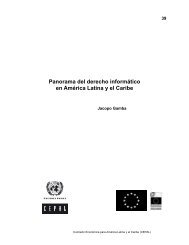Palabras en juego
Palabras en juego
Palabras en juego
You also want an ePaper? Increase the reach of your titles
YUMPU automatically turns print PDFs into web optimized ePapers that Google loves.
ecame “the information society” [4].<br />
At civil society level, American and European NGOs in particular have since the<br />
early nineties focused on specific human rights chall<strong>en</strong>ges within a digital<br />
<strong>en</strong>vironm<strong>en</strong>t, especially in relation to the protection of privacy and freedom of<br />
expression. This initial US / European lead has today turned into an increasingly<br />
large number of civil society groups from all over the world, focusing on analysis<br />
and policy campaigns for the def<strong>en</strong>se of human rights standards in a digital<br />
context. [5] One of the largest networks of these groups is the Global Internet<br />
Liberty Campaign (GILC), an umbrella organization with curr<strong>en</strong>tly more than 60<br />
member organizations [6]. However, long before the developm<strong>en</strong>t of the cyber<br />
rights community with its more specific Internet focus, a number of social<br />
movem<strong>en</strong>ts had raised issues of information and media ownership and access to<br />
communication. [7]<br />
Wh<strong>en</strong> the World Summit of the Information Society (WSIS) process took off in<br />
2002, one of its important contributions was to create and facilitate a global space<br />
where these very diverse civil society groups and movem<strong>en</strong>ts met and were forced<br />
to interact since they were included in a formal UN process as one voice; the voice<br />
of “civil society” [8]. Both in terms of mutual ¬learning and networking on a global<br />
scale, and in terms of ¬putting human rights on the information society ag<strong>en</strong>da [9],<br />
the WSIS process played a significant role.<br />
Dignity, liberty, and the equity of all human beings<br />
No single definition of the rather broad concept of “human rights in the information<br />
society” exists, although many docum<strong>en</strong>ts praise human rights as the foundation<br />
for the information age.<br />
The concept has at least two connotations. One relates to the ways in which<br />
technology can be used as an <strong>en</strong>abler for human rights workers. Countless<br />
examples exist showing how Internet has facilitated communication from<br />
suppressed groups, have <strong>en</strong>abled human rights activists to report on violations, to<br />
campaign across borders and to reach global information, and support to<br />
str<strong>en</strong>gth<strong>en</strong> their case [10].<br />
The other use of the concept, which is the main focus here, relates to the<br />
chall<strong>en</strong>ge of protecting and <strong>en</strong>forcing human rights standards at a point in time<br />
wh<strong>en</strong> new communicative means are ess<strong>en</strong>tially changing the way we live, work,<br />
and develop. Human rights are subject to dynamic interpretation, and part of their<br />
ess<strong>en</strong>ce is their recognition as standards in a giv<strong>en</strong> context at a giv<strong>en</strong> time. This<br />
requires analysis as to how human rights are affected by curr<strong>en</strong>t developm<strong>en</strong>ts,<br />
how the core of a giv<strong>en</strong> right is pot<strong>en</strong>tially threat<strong>en</strong>ed, how it can be <strong>en</strong>hanced,<br />
and - crucially - to what ext<strong>en</strong>t the existing system of protection is adequate and<br />
effective giv<strong>en</strong> the realities of new technological developm<strong>en</strong>ts. The international<br />
body of human rights is thus in perpetual evolution to dismiss new threats as well<br />
as to <strong>en</strong>compass new opportunities for their ext<strong>en</strong>sion. Historically this evolution<br />
has always be<strong>en</strong> the result of social struggles led by differ<strong>en</strong>t groups in specific<br />
historical junctures. The relatively rec<strong>en</strong>t codification of wom<strong>en</strong>’s rights and the<br />
rights of indig<strong>en</strong>ous peoples are a case in point.<br />
Civil Society repres<strong>en</strong>tatives att<strong>en</strong>ding the WSIS have stressed that to apply the<br />
human rights framework to the information society implies taking dignity, liberty<br />
and the equity of all human beings as the starting point of refer<strong>en</strong>ce rather than



